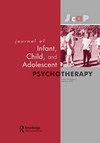反思性功能问卷(RFQ):波斯语翻译的心理测量特征及其在青少年父母依恋与内化、外化问题关系中的中介作用探讨
Q3 Psychology
Journal of Infant, Child, and Adolescent Psychotherapy
Pub Date : 2021-07-03
DOI:10.1080/15289168.2021.1945721
引用次数: 10
摘要
摘要本研究的目的是将反思功能问卷(RFQ)改编成波斯语,并检验反思功能(RF)在青少年依恋父母与内化和外化问题之间的中介作用。369名青少年完成了RFQ的波斯语翻译,亲密关系经验关系结构问卷(ECR-RS),一系列评估亲密关系相关结构的量表,以及青少年自我报告问卷(YSR)。验证性因子分析支持心理状态确定性与不确定性的双因子模型。通过RFQ及其相关构念与适应不良心理功能的相关性检验构念效度。结构方程模型表明,心理状态的不确定性和确定性在依恋焦虑与内化和外化问题之间都起着正相关的中介作用。在依恋回避与内在化或外在化问题的关系中没有发现这种中介效应。这些发现支持RFQ的波斯语翻译可以成为评估非临床青少年RF的适用和可靠的工具。总之,本问卷对波斯语临床医生和研究人员来说是一种有效的测量方法。本文章由计算机程序翻译,如有差异,请以英文原文为准。
Reflective Functioning Questionnaire (RFQ): Psychometric Properties of the Persian Translation and Exploration of Its Mediating Role in the Relationship between Attachment to Parents and Internalizing and Externalizing Problems in Adolescents
ABSTRACT The aim of this study was to adapt the Reflective Functioning Questionnaire (RFQ) into Persian and to test the mediating role of Reflective Functioning (RF) in the relationship between attachment to parents and internalizing and externalizing problems in adolescents. 369 adolescents completed a Persian-translation of the RFQ, the Relationship Structures questionnaire of the Experiences in Close Relationships Revised (ECR-RS), a battery of scales that assess constructs related to RF, and the Youth Self Report questionnaire (YSR). Confirmatory factor analysis supported the two-factor model consisting of certainty and uncertainty about mental states. Construct validity was examined by the correlation between RFQ and related constructs and maladaptive psychological functioning. Structural equation modeling showed that uncertainty and certainty about mental states both mediated the positive relationship between attachment anxiety and internalizing and externalizing problems. This mediating effect was not found in the relationship between attachment avoidance and internalizing or externalizing problems. These findings provide support for the notion that the Persian-translation of the RFQ can be an applicable and reliable tool to assess RF in non-clinical adolescents. In conclusion, this questionnaire represents a valid measure for Persian-speaking clinicians and researchers.
求助全文
通过发布文献求助,成功后即可免费获取论文全文。
去求助
来源期刊

Journal of Infant, Child, and Adolescent Psychotherapy
Psychology-Clinical Psychology
CiteScore
1.70
自引率
0.00%
发文量
37
 求助内容:
求助内容: 应助结果提醒方式:
应助结果提醒方式:


